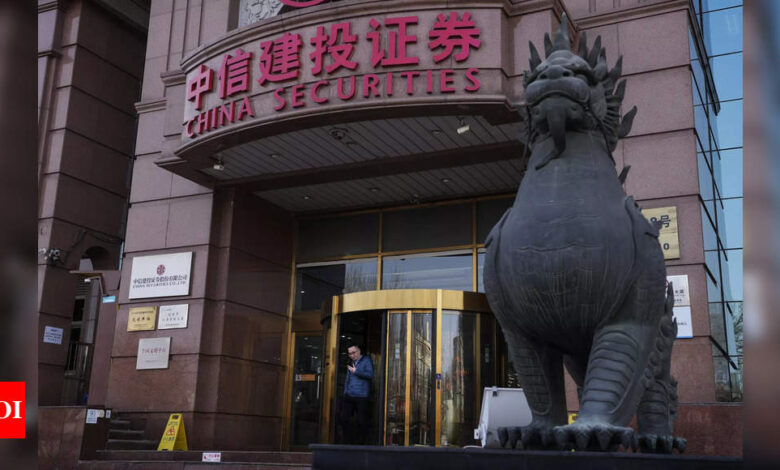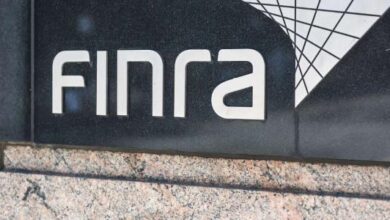Brokers
Meet China’s New Securities Regulator: The ‘Broker Butcher’ | International Business News

China surprised investors when it unexpectedly named Wu Qing, a 58-year-old market veteran, as the new chairman and Communist Party chief of the nation’s securities regulator. The abrupt appointment — coming just one day before markets close for the Chinese New Year holidays — underscores the urgency Beijing sees in addressing a stubborn rout in the country’s $8 trillion stock market.
Here’s what we know about this key move in the world’s second-biggest economy.
1. Why is Wu Qing nicknamed the ‘Broker Butcher’?
Wu got the nickname ‘broker butcher’ during a previous stint at China’s Securities Regulatory Commission when he shuttered 31 firms for violations in the mid-2000s — about one-quarter of the total number of securities companies at the time. In 2009, he also led a crackdown on insider trading at mutual funds.
2. What’s his background for this role?
Wu has years of political and financial experience, previously leading the Shanghai Stock Exchange for almost two years and serving as a key deputy in Shanghai’s municipal government before this latest appointment. In Shanghai, Wu’s responsibilities included overseeing the city’s finance industry and taxation as well as the development of its free trade zones.
Wu also has important ties to China’s No. 2 official, Premier Li Qiang, after serving alongside him when Li was Shanghai’s party chief. Wu was believed to be positioned to replace CSRC Chairman Yi Huiman last year but he ended up receiving a promotion in Shanghai’s government instead.
3. What does Wu need to do in this new role?
President Xi Jinping has made avoiding major financial risks a top priority as officials strive to boost the post-Covid economy. That leaves Wu with a challenging task: China’s stock market has slumped for a fourth straight year and suffered a $5 trillion rout. The country is also struggling to contain a real estate crisis, deflationary pressures and increasing geopolitical tensions.
As part of his new portfolio, Wu will also need to help lure foreign financial firms to China at a time when Wall Street banks have been scaling back their onshore businesses amid all the economic and political headwinds.
4. What else do we know about him?
Wu is a low-key technocrat who has expressed zero tolerance for wrongdoing, according to a person familiar with him. He’s sometimes joked that he is more fit to be a surgeon. Yet with a PhD in economics from Renmin University of China in Beijing and his history in China’s mainland financial capital, Shanghai, Wu has been a big advocate of financial opening and digitization.
5. How has the market reacted to Wu so far?
The new appointment sparked a small rally in China stocks. The onshore benchmark CSI 300 Index rose as much as 0.7% in early Thursday trading before trimming gains. China’s previous appointments of CSRC chiefs have proved successful in lifting stocks, with the CSI 300 gaining more than 40% in almost a two-year span after Liu Shiyu replaced Xiao Gang in 2016.
6. What else is Xi doing to reverse China’s rout?
Xi’s government has rolled out a series of measures meant to bolster markets. Officials recently imposed caps on some brokerages’ cross-border total return swaps with clients, limiting a channel that can be used by China-based investors to short Hong Kong stocks.
There’s also a government rescue package under consideration backed by about 2 trillion yuan ($280 billion), a sudden bank reserve ratio cut by the People’s Bank of China and efforts to guide institutional investors and funds to increase A-share holdings. Whether any of that will be sufficient remains to be seen.
Here’s what we know about this key move in the world’s second-biggest economy.
1. Why is Wu Qing nicknamed the ‘Broker Butcher’?
Wu got the nickname ‘broker butcher’ during a previous stint at China’s Securities Regulatory Commission when he shuttered 31 firms for violations in the mid-2000s — about one-quarter of the total number of securities companies at the time. In 2009, he also led a crackdown on insider trading at mutual funds.
2. What’s his background for this role?
Wu has years of political and financial experience, previously leading the Shanghai Stock Exchange for almost two years and serving as a key deputy in Shanghai’s municipal government before this latest appointment. In Shanghai, Wu’s responsibilities included overseeing the city’s finance industry and taxation as well as the development of its free trade zones.
Wu also has important ties to China’s No. 2 official, Premier Li Qiang, after serving alongside him when Li was Shanghai’s party chief. Wu was believed to be positioned to replace CSRC Chairman Yi Huiman last year but he ended up receiving a promotion in Shanghai’s government instead.
3. What does Wu need to do in this new role?
President Xi Jinping has made avoiding major financial risks a top priority as officials strive to boost the post-Covid economy. That leaves Wu with a challenging task: China’s stock market has slumped for a fourth straight year and suffered a $5 trillion rout. The country is also struggling to contain a real estate crisis, deflationary pressures and increasing geopolitical tensions.
As part of his new portfolio, Wu will also need to help lure foreign financial firms to China at a time when Wall Street banks have been scaling back their onshore businesses amid all the economic and political headwinds.
4. What else do we know about him?
Wu is a low-key technocrat who has expressed zero tolerance for wrongdoing, according to a person familiar with him. He’s sometimes joked that he is more fit to be a surgeon. Yet with a PhD in economics from Renmin University of China in Beijing and his history in China’s mainland financial capital, Shanghai, Wu has been a big advocate of financial opening and digitization.
5. How has the market reacted to Wu so far?
The new appointment sparked a small rally in China stocks. The onshore benchmark CSI 300 Index rose as much as 0.7% in early Thursday trading before trimming gains. China’s previous appointments of CSRC chiefs have proved successful in lifting stocks, with the CSI 300 gaining more than 40% in almost a two-year span after Liu Shiyu replaced Xiao Gang in 2016.
6. What else is Xi doing to reverse China’s rout?
Xi’s government has rolled out a series of measures meant to bolster markets. Officials recently imposed caps on some brokerages’ cross-border total return swaps with clients, limiting a channel that can be used by China-based investors to short Hong Kong stocks.
There’s also a government rescue package under consideration backed by about 2 trillion yuan ($280 billion), a sudden bank reserve ratio cut by the People’s Bank of China and efforts to guide institutional investors and funds to increase A-share holdings. Whether any of that will be sufficient remains to be seen.





